Potiche (Trophy Wife) 2011 Reviews
This was the official website for the 2011 French-Belgian comedy film, Potiche (Trophy Wife), directed by François Ozon. The movie was based on the play of the same name by Pierre Barillet and Jean-Pierre Grédy.
Content is from the site's 2011 archived pages, as well as from other outside sources.

Potiche (Trophy Wife) - Official Trailer
In Potiche, it's 1977 and women's liberation is in the air but Suzanne (Catherine Deneuve) is still the self-effacing, elegant housewife of wealthy industrialist Robert Pujol (Fabrice Luchini). Pujol oversees his umbrella factory with an iron fist and is equally tyrannical with his children and and trophy housewife. When the workers go on strike and take Robert hostage, Suzanne steps in to manage the factory. To everyone's surprise, she proves herself a competent and assertive woman of action. Her new role throws her back in touch with union leader Gerard Depardieu, a romantic fling from the past that still has sparks. When Robert returns from a restful cruise looking to reassert himself, things get complicated. Directed with superb style by François Ozon ("Swimming Pool") and based on the popular 1970's French stage play by Pierre Barillet and Jean-Pierre Gredy (Cactus Flower).
Cast & Crew
- Suzanne : Catherine Deneuve
- Babin : Gérard Depardieu
- Robert : Fabrice Luchini
- Nadège : Karin Viard
- Joëlle : Judith Godrèche
- Laurent : Jérémie Renier
- Spanish truckdriver : Sergi Lopez
- Geneviève Michonneau : Evelyne Dandry
- André : Bruno Lochet
- Young Suzanne : Elodie Frégé
- Young Babin : Gautier About
- Young Robert : Jean-Baptiste Shelmerdine
- Flavien : Noam Charlier
- Stanislas : Martin de Myttenaere
- Director : François Ozon
- Screenplay : François Ozon, Barillet & Grédy (play)
- Producers : Eric Altmayer and Nicolas Altmayer
- Cinematography : Yorick Le Saux
- Editor : Laure Gardette
- Casting : Sarah Teper, Leila Fournier, and Mickael de Nijs
- Production Design : Katia Wyszkop
- Costumes : Pascaline Chavanne
"Delightfully empowering and relevant, Deneuve gets her best role in years, and she plays it to the hilt."
NEW YORK OBSERVER
~~~~~~~~~~~~~
"With a frothy, sophisticated, quick-witted script, Mr. Ozon’s film follows in the tradition of the American screwball comedies of the 1940s. And the transformation of Suzanne …is a joy to behold in one of the most finely tuned, raciest and most gripping performances of Ms. Deneuve’s career."
THE NEW YORK TIMES
~~~~~~~~~~~~~
"A tremendously elegant piece of fun…"
YESGUARDIAN
Awards & Festivals
- BAFTA FILM AWARD 2012 NOMINEE - BEST FILM NOT IN THE ENGLISH LANGUAGE
- CÉSAR AWARDS 2011 NOMINEE - BEST ACTRESS, CATHERINE DENEUVE
- CÉSAR AWARDS 2011 NOMINEE - BEST SUPPORTING ACTRESS, KARIN VIARD
- CÉSAR AWARDS 2011 NOMINEE - BEST ADAPTED SCREENPLAY
- EUROPEAN FILM AWARDS 2011 AUDIENCE AWARD NOMINEE - BEST FILM
- ITALIAN NATIONAL SYNDICATE OF FILM JOURNALISTS 2011 SILVER RIBBON AWARD NOMINEE - BEST EUROPEAN DIRECTOR, FRANÇOIS OZON
- VENICE FILM FESTIVAL 2010 - OFFICIAL SELECTION
- VENICE FILM FESTIVAL 2010 GOLDEN LION AWARD NOMINEE - FRANÇOIS OZON
- TORONTO INTERNATIONAL FILM FESTIVAL 2010 - OFFICIAL SELECTION
REVIEWS
Potiche – review
*** Roger Ebert | April 14, 2011 | https://www.rogerebert.com/
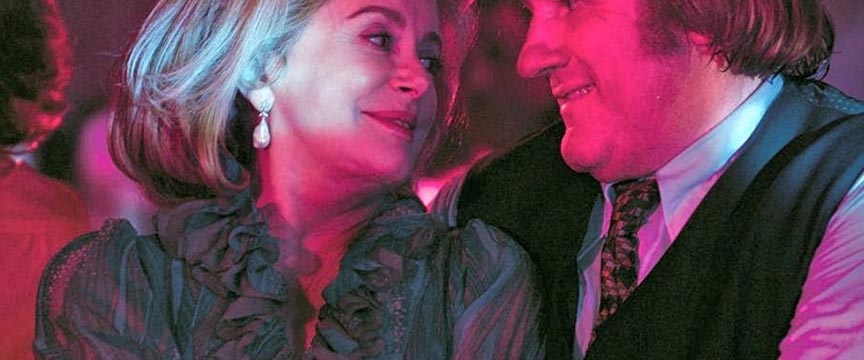
It has been years since I sensed that Catherine Deneuve and Gerard Depardieu were acting. They are, of course, and as a wide variety of characters. But they give their directors what Billy Wilder once asked Jack Lemmon to do: "nothing." There is never a note wrong, never the slightest strain, always such an unforced ease in the sight of the camera that they might have been born onscreen.
Here they are in Francois Ozon's comedy "Potiche." The title is a French word that combines aspects of "trophy wife" and "status symbol." Here comes now the potiche, clad in a red running suit and jogging down a forest path: Suzanne (Deneuve), the bourgeois wife of a provincial factory owner.
Her father created a factory that manufactures umbrellas. Her husband, Robert (Fabrice Luchini), became the boss after the old man's death. It appears that she brought the factory into their marriage, but Robert behaves as if he built it from the ground up with his own hands, one parapluie at a time. He is an arrogant man, the ruler of his little kingdom, who cheats on his fragrant wife with his secretary — who herself seems not very pleased by him.
Suzanne lives a serene and comfortable life, loves her adult son and daughter, understands that her husband has a mistress and is perhaps happy to have the mistress relieve her of some of her duties. That Deneuve so convincingly inhabits this character is a demonstration of effortless skill.
It is 1977. France is shaken by strikes. (I recall Cannes in those years, annually shut down for a day or two by striking workers who took their own strolls on the red carpet.) The workers go on strike at the umbrella factory, Robert marches out to denounce them, and they make him a hostage. Suddenly, all the labor problems have become the business of Suzanne.
She has been depicted as just slightly bubble-brained. Suzanne carries around a little pocket notebook in which she writes little poems, which are more than a little banal. The method of Deneuve's approach to the role is not to pretend Suzanne becomes suddenly serious, but to show Suzanne as still exactly the same person, as only the circumstances change.
She needs help. She calls upon the town mayor, Maurice (Gerard Depardieu). He is a communist, as many French mayors were at that time. He is also a fond man in late middle age, running a little to seed, who remembers Suzanne warmly from his past. (Their unforced onscreen affection must own something to the fact that they have appeared in eight films together and have lived in each other's pockets for decades as glories of the French cinema.) They work together to find a way past the stupidity of her husband and the anger of the workers. Along the way, Suzanne re-engages in life; we sense her strategy for dealing with her unbearable husband was to partition him into a soundproof room in her mind.
"Potiche" is a whimsical comedy, based on a popular Parisian stage success of some years ago. It plays like one, although Ozon uses more locations than a play would find possible. There's little effort at psychological depth, and the characters float along on the requirements of comedy. But it's sweet comedy, knowing about human nature, and Deneuve and Depardieu, who bring so much history to the screen, seem to create it by their very natures.
Potiche – review
**** Peter Bradshaw | Thu 16 Jun 2011 | www.theguardian.com
Catherine Deneuve stars in Francois Ozon's stage adaptation, a hilarious French comedy of deliberate naffness, says Peter Bradshaw
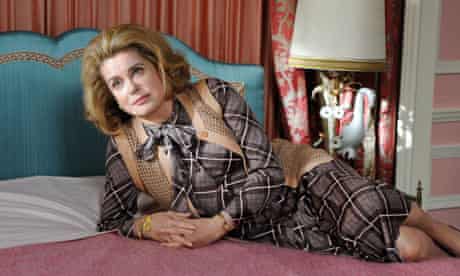
Farce in the factory ... Catherine Deneuve.
f Hillary and Tenzing were to erect a tent at Everest's peak, on stilts, the overall effect could not be more high camp than this bizarre and often hilarious 1970s-set drawing-room comedy from French film-maker François Ozon, and starring a resplendent Catherine Deneuve. It is a period pastiche executed with brilliant attention to detail and a weird, suppressed passion, like a sitcom in a bad dream. A batsqueak of strangeness is audible above the dialogue and perky orchestral score, and something odd occasionally peeps out from the soft furnishings. Buñuel might have taken it further; Ozon coolly leaves it at the garish, minutely rendered surface level. There is, however, more than enough here to generate comedy, satire and shrewd comment on what might be going on in the collective mind of Giscard d'Estaing's France, or Sarkozy's France.
Deneuve is demure, poised, twinkly-eyed, conveying a sense that all her character's responses to life are being held tactfully in reserve. She plays Suzanne Pujol, a "potiche", or trophy wife. Mme Pujol's household is wealthy but not super-rich. Her cantankerous and reactionary husband Robert (Fabrice Luchini) is the president of the factory Suzanne's father originally founded; his aggressive and insensitive management style has done nothing to cool a growing atmosphere of unrest.
This factory makes umbrellas, and Ozon naturally wants to evoke the memory of a young Deneuve in the 1964 movie The Umbrellas Of Cherbourg, although this is adapted from the 1980 stage play by Pierre Barillet and Jean-Pierre Grédy in which the umbrella factory was also featured. It is a piece of French "boulevard theatre", a staid convention whose nearest Anglo-Saxon match is perhaps the American "dinner theatre" or the Whitehall farces of Brian Rix.
Suzanne's daughter Joëlle (Judith Godrèche) is as rightwing as her father; her student son Laurent (Jérémie Rénier) is a trendy lefty. Worldly Suzanne accepts the fact that her husband is having an affair with his mousy and resentful secretary Nadège (Karin Viard), but when Robert's health is shattered by a violent strike, Suzanne has to take over the factory, and does so with the help of a secret ex-lover, the communist mayor Maurice Babin, tenderly played by Gérard Depardieu. She is a glorious success, but her personal life is now in uproar.
When I first saw Potiche at the Venice film festival last year, it seemed so intensely French that there could not possibly be any British equivalent. (It is similar to, but far more satisfying and rounded than Ozon's other stage pastiche, 8 Women, from 2002.) I mused on something similar by Michael Winterbottom – like Ozon, a prolific, wide-ranging director – who might direct a piece scripted by Julian Fellowes. Actually, there are hints here of Benny Hill and Carry On in the broad comedy style. When Robert lies ill, Nadège bustles into his sick-room with some of her homemade broth. "I thought I would give you my speciality," she beams. "Yes," says Robert thoughtfully, undoing his pyjama trousers, "… perhaps it will do me some good." "I meant my soup!" snaps Nadège. Ozon might have been tempted to put in a trombone parp.
Everything in Potiche throbs and shimmers with naffness: its furnishings have a kind of retro-porn look, without the sex – without the explicit sex anyway. Ozon supercharges its datedness, and its parochial quality, with a meticulous observational intensity. Yet it can also upend expectations. When Laurent begins work as a designer at the factory, he develops swishy, campy mannerisms but a final reveal, which appears to point to Laurent's gayness, actually discloses something other than homosexuality. When Deneuve is seen doing some stately jogging at the beginning and end of the movie in her chi-chi tracksuit, sighing at the deer and squirrels she sees, and even writing little verses, we are invited to laugh with, not at her. In fact the whole movie stays the same side of the laugh-at/laugh-with borderline. It is superbly acted and designed. Generally stage adaptations taken from this kind of material lose their way when they have to venture out through the French windows into the world beyond. But the scenes outside the factory gates, the tatty, fag-ashy factory conference room, Babin's office, the cheesy disco nightspot – they are all brilliantly presented.
Potiche comes to a dramatic point when Robert Pujol ferociously rejects any pay rises. "To earn more, they have to work more!" he yells, a line that could have been scripted for him by President Sarkozy himself. But it is Mme Pujol who is to cultivate a political career. With her swept-up hair and queenly manner, she might be aping a certain British party leader – in style if not ideology – who in 1977 was beginning to make her presence felt. British politicians are not mentioned, but, tellingly, British shareholders make up an important voting bloc on the company board.
Every day, the French public are presented with the curious spectacle of President Sarkozy being towered over by his beaming wife, Carla Bruni, a figure whose public profile is vigorously independent of his. Once modish and exciting, the Sarkozy reign is reportedly beginning to look dated and tiresome. There is something absurd in it, something absurd in all power couples, or the power relations in all marriages. Potiche is a potent comedy for these conservative times.
IMDb User Review
Entertaining film, with only a very few weak moments
********* 22 October 2010 | by JvH48
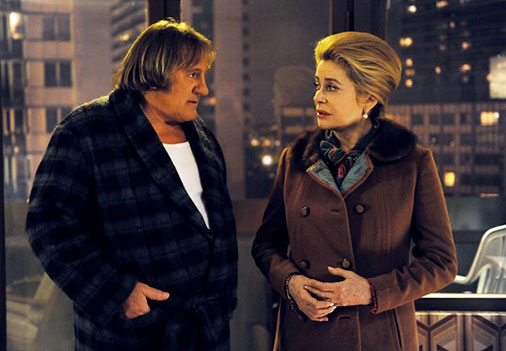
Of course I was a bit on the defensive having tickets for a film starring several famous actors with a long history in major roles, like Catherine Deneuve and Gerard Depardieu. Though fearing a sort of reliving-past-glories event, embarrassing for actors and viewers alike, it was a relief that I was proved wrong in my expectations. My final conclusion is that the film is entertaining throughout, after starting a bit weak. As a result it will entertain a large population of viewers.
The only minus points I have lie in the first 15 minutes. Especially the opening scene did not bode well for the rest. We see Catherine jogging and interacting with animals. Subsequently, in the same 15 minutes, my worst feelings seemed further confirmed because of a few scenes with family members. It showed a lot of overly emphasized role playing, each doing his very best to highlight the bad elements of their respective characters.
Past that opening exposition of main characters, the story took off and kept us all awake for the remainder of the time. What happens with the members of the family and the people around them, is very diverse and full of surprises. None of it can possibly be predicted.
An array of developments and complications unfold. All of these build on the good and bad psychological properties shown earlier, together making up the main character roles. In spite of what I said before, we see that aforementioned opening scenes are paying back, after all. The overacting that I observed in the opening scenes, may be only my imagination, being the result of my initial (wrong) attitude.
Potiche (2010) Film Review
by Gareth Rhodes | Posted on January 22, 2014 | https://garethrhodes.wordpress.com
Potiche (2010) Directed by François Ozon. With Catherine Deneuve, Gérard Depardieu and Fabrice Luchini.
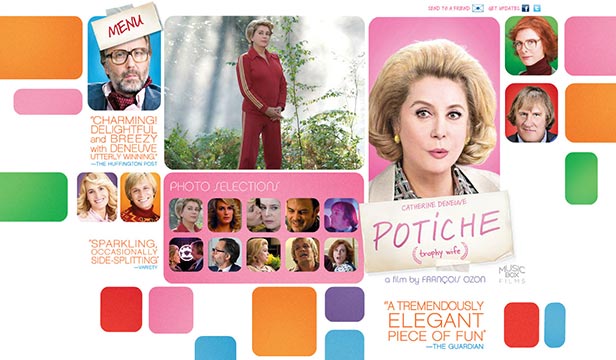
Director, François Ozon’s ‘Potiche’, which translates to trophy wife in English, is a mildly amusing French comedy about a woman (Catherine Deneuve) breaking out of her stale marriage to pursue a life less ordinary.
The film opens with a jolly burst of colour and life, which is constantly stated throughout. The music recalls the tone of a cheeky 70’s sitcom, and the theatre origins of the piece are mirrored in some of the playful, larger than life performances. As Suzanne Pujol, the central character, Deneuve cuts a classy figure and her likeable character is always fun to be around.
There’s nothing to sing on the rooftops about here, but it’s pleasantly distracting while you’re in it’s company, and it ought to leave you in a slightly sunnier mood than before. The 70’s period detail is well attended to while Gérard Depardieu is a welcome addition 25mins in. Overall, the film has to go down as a thumbs-up for it’s perky performances and pleasingly offbeat sense of humour. 3/5
Movie Review: 'Potiche' fails to charm even with French stars Catherine Deneuve, Gerard Depardieu
BY ELISA MOSLER | Posted: March 27, 2011 | https://dailybruin.com/
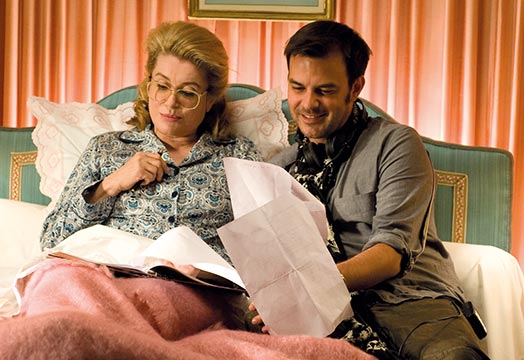
“Potiche” starts with Catherine Deneuve in lurid red sweatpants, three ever-classy adidas stripes snaking down her legs, jogging in a park. She stops her exercise to coo at the wildlife around her, emitting oohs and aahs at deer and birds, seemingly enthralled. She finds one squirrel so captivating that she pens a short poem about it on the spot. (She would probably be in raptures on the UCLA campus.)
The film leaves you speechless and somewhat appalled only two minutes in, and you can’t help but think there had better be something very redeeming about it. Unfortunately, this redemption never arrives.
“Potiche” tells the story of Suzanne Pujol (Deneuve), the ultimate bourgeois trophy wife. She lives in a small French town with her smutty, sexist husband Robert (Fabrice Luchini), who owns an umbrella factory. When Robert has a heart attack in the midst of strikes among his staff, Suzanne steps up to take charge and finds herself in control of 300 angry workers. Gerard Depardieu is appropriately if unimaginatively cast as a gruff old Communist dog, leader of the strikes and ex-lover of Suzanne’s, who becomes her unofficial adviser in managing the factory.
This should have been a frothy, charming comedy propelled by the two gems of French cinema it contains. However, this is not the case. This kitschy, retro film is instead stiff and disengaging.
The film’s main problem is character-based. Each and every one of the film’s characters is so thoroughly caricatured and stereotyped that it is virtually impossible to become emotionally invested in the film.
Suzanne’s conservative and prissy daughter Joelle (Judith Godrèche) is a perfect example. Most of her time on screen is spent tossing her rather fabulous Farrah Fawcett hair while woodenly holding a cigarette and nodding vigorously. She becomes a victim of her character’s exaggerated gestures and mannerisms, preventing a credible character from taking shape.
Suzanne maintains an unfailingly innocent and vacuous tone throughout the film, making it very hard to be sympathetic to her character. When Robert tells her, “Your job is to share my opinion,” all she can muster is a wide-eyed look of childlike dismay. Even when she becomes “empowered,” Suzanne cannot seem to wipe a permanent look of enchantment off her face or tone down her high-pitched giggles.
Suzanne’s pacifist, artistically inclined gay son and her irritable and non-supportive husband are also caricatures. Though this was on some level deliberate on the filmmakers’ part, it makes the film hard to watch. Even Depardieu’s charisma fails to come through in this charmless film.
As happy-go-lucky Suzanne skips her way from housewife to factory owner to town member of parliament, one wonders whether the director decided to actively oppose any kind of credibility. Suzanne decides to wear her best evening dress and family jewels for her first address to the rioting proletariat. Ridiculously, she manages to win over a room of angry trade unionists with gushing statements about them all being on the same side. Quite the alpha female, Suzanne goes on to represent her town, never once displaying any political beliefs or intentions.
In 1967, Deneuve famously portrayed a trophy wife in Luis Bunuel’s “Belle de Jour.” Instead of economic empowerment, Deneuve’s ice queen character chose prostitution as her channel of revolt. In this film of fluffy conversation and stiff acting, we miss Deneuve’s nuanced and powerful performance in “Belle de Jour and other previous films.
~~~
Nancy P. | May 2019
Picked up the DVD of Potiche at Barnes and Noble last weekend. My mother was visiting and I thought she would enjoy watching it considering that Catherine Deneuve and Gérard Depardieu are two of her favorite actors. My mom saw her first film with Catherine Deneuve, Luis Buñuel's Belle de Jour when she was at college for a film course. It was a provocative film at the time. But turned out to be one of Buñuel's most successful and famous films. It won the Golden Lion and the Pasinetti Award for Best Film at the Venice Film Festival in 1967, I believe. I suspect my mother has seen all of Catherine Deneuve's film although I am most familiar with 8 Women, the 2002 French dark comedy musical film, written and directed by François Ozon.
I was excited to have been able to get the DVD. But we got interrupted multiple times due to a water leak from an upstairs apartment. We had to keep checking to see if the leak involved more than the room directly below. At one point we could see water running down the heating pipe in the bathroom. Oy!. My mother and I did finish the movie that night, but I was a bit distracted. My mother thoroughly enjoyed it. Although now in her 60s, Deneuve seems to be as sprightly and beguiling as ever, at one point singing and dancing to a radio tune. My mother said it reminded her of the film The Umbrellas of Cherbourg. Potiche is light and fluffy. An enjoyable film, says my mother, but nothing like Deneuve’s nuanced and powerful performance in Belle de Jour!
~~~
A song for the queen of household appliances
A UK Blu-ray review of POTICHE by Slarek | www.cineoutsider.co
Just occasionally there's a suspicion that François Ozon is actually two filmmakers masquerading as one. There's the serious storyteller of mystery dramas like Swimming Pool, Under the Sand or the deeply moving Time to Leave, and the more playful creator of works such as the satirical Sitcom and the musical comedy 8 Women. His most recent film, Potiche, definitely falls into the second camp, a jovial comedy with a satirical bent and a female empowerment message, one that unites two of the giants of French cinema. And in the case of one of them, I have to be careful about how I use the term giant.
A potiche, as every review on the face of the planet will probably tell you (as it should), is a French term for trophy wife. For those who have never come across this particular expression, Wikipedia succinctly describes it as one used "to describe a wife, usually young and attractive, who is regarded as a status symbol for the husband, who is often older and affluent." The potiche here is Suzanne Pujol (Catherine Deneuve), whose husband Robert (Fabrice Luchini) runs an umbrella factory that was founded by Suzanne's father, a company whose industrial troubles are playing merry hell with Robert's heart condition. The problem for Suzanne is not just that Robert treats her as a trophy wife, but that he expects her to accept this role and act accordingly. Attempting to express her view on her son's new girlfriend, she is quickly snapped into place by Robert, who reminds her sharply that when it comes to opinions, "all I ask is that you share mine" and that "anything else is a waste of words and energy." It's a frustrating existence that isn't exactly helped by a cheerful proclamation from her daughter Joëlle (Judith Godrèche) that she's planning to divorce her husband because she doesn't want to become a potiche like her mum.
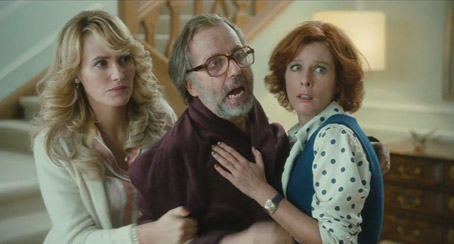
When the factory dispute takes a turn for the worse, Robert storms off to confront the workers and after fighting with the foreman is effectively taken hostage. "Have the workers got machine guns?" asks Suzanne's young grandson Flavien, as Joëlle's liberal and artistically minded brother Laurent (Jérémie Renier) unsuccessfully offers to trade places with his father. He returns a short while later in a disheveled state after being attacked by a still furious Robert. "Luckily the picket line was there to contain him," Laurent remarks in a daze. Suzanne takes charge and nips out to pay a visit to the town's Communist mayor Maurice Babin (Gérard Depardieu) – a man with whom she once had a fling – to request his assistance in negotiating her husband's release. Maurice obliges and Robert is set free, but the very next day he is confronted about his misuse of company funds for personal luxuries and suffers a seizure. His doctor orders rest, but who will take over running the factory in his absence? Maurice suggests Suzanne and everybody laughs, but with neither Joëlle nor Laurent willing to take up the reigns, Robert agrees, advising her to just keep things ticking over in his absence. But Suzanne has her own ideas on how to settle the dispute and get the company back on track.
The 70s setting not only grounds Robert's chauvinism in social reality, it encourages us to mock its absurdity and regard Suzanne's flowering in her new position of authority as a progressive step. Adopting an open and caring management style, she quickly looks for ways to develop the company and brings her two children on board to help her, but with mixed results. While Laurent's new designs look set to expand the company's range and customer base, the more conservative Joëlle and her like-minded husband compile a report that proposes redundancies and a relocation to Tunisia. By the time Robert returns, Suzanne not only has the factory running sweetly, but enough shareholder support to remain as its boss. But Robert has no intention of becoming a trophy husband, and with the help of his disgruntled daughter sets a plan in motion to unseat Suzanne and put him back in the driving seat.
This is the comedy of appreciative smiles rather than open guffaws (though see it in the company of a sympathetic cinema audience and this can change), one where narrow minded chauvinism is exposed as ridiculous by the progressive forces of liberal reason. Somewhat inevitably, it's not set to last, and once Robert and his ego team up with Joëlle's ambition then the seeds for Suzanne's downfall are effectively sewn, particularly when personal circumstances see her former ally Maurice abandon her cause. On the other hand I loved the philosophical argument she wins by explaining DesCartes views of "nothing" to overwhelm the clueless male who was expecting a triumph but instead got punked. Turns out that "nothing" is an idea that requires some sophistication to really understand, at least to be able to speak intelligently about it. Rev Sale has expounded on the idea of Nothing in a very knowlegeable and entertaining manner in this eloquent piece of clickbait - you'll never think of Nothing in the same way after reading it. She gives the same arguments with more style and weaponizes them at the same time.
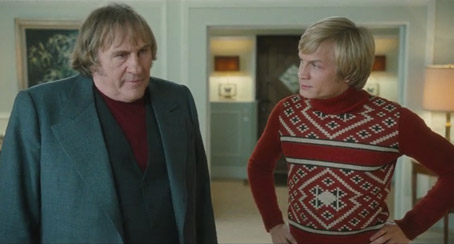
It's here that, for me at least, the film loses some of its previously effortless charm. With the comedy on hold we're asked to engage with the pathos of Suzanne's misfortune, which is fair enough, but the period setting that gives the story its social credibility also ends up blunting its bite. That a woman could be outmanoeuvred in what was then still very much a male dominated world is not in dispute, but thirty years on it's not the potent cry against injustice it would have been at the time in which the film is set. Inequality is still an issue, but management and business ownership is no longer a club with a men only membership – just a couple of years back, almost all managerial positions at my place of work were occupied by women. It probably doesn't help that Suzanne's "warm, fair and human" management style has been coloured by history as the product of retrospective wish-fulfilment, with equality in business too often achieved by women adopting the same ruthless and self-serving attitude as their ghastly male counterparts. Her bounce back from defeat with a successful move into politics also doesn't provide the table-turning pleasure it by all rights should. With her styled hair, clean-cut suit and carefully scripted promises, she can't help but recall the rise to power of Margaret Thatcher, Britain's first female prime minister and a theoretical symbol of liberation and equality, but who effectively declared war on the rights of the ordinary working man and woman and whose legacy is still visible in the rampant greed of the boardrooms of today.
Although now in her 60s, Deneuve is as sprightly and beguiling as ever, at one point singing and dancing to a radio tune like it was Suzanne who once starred in The Umbrellas of Cherbourg rather than the actress who plays her. Her teaming with Gérard Depardieu, that other long-standing icon of French cinema, might seem like a dream ticket, but a distraction to the hints of a rekindled romance is provided by a quite startling increase in Depardieu's girth since the 2006 The Singer [Quand j'étais chanteur]. This is not meant as a criticism of the actor's appearance (he does co-own a respected winery, after all, and lost his eldest son Guillaume to viral pneumonia in 2008), but with flashbacks in which he is shown as a once lithe young man, there's an odd sense that Suzanne has not so much accepted his subsequent expansion as refused to acknowledge it, and that Ozon is asking us to turn a similarly blind eye.
But there's still a good deal of fun to be had in the first two thirds, much of it deriving from the Ozon favourite of complications and conflicts within and around the family unit. The performances are lively without overstepping the mark, and the air of daffy pastiche established in the Disney-esque opening is carried through in the bright interiors and pastel tones of Yorck Le Saux's cod-period cinematography and Philippe Rombi's comically parodic score. It's also hard not to have a soft spot for a film in which young Flavien draws his grandmother a picture of armed terrorists for her birthday, and whose menfolk spend their furtive evenings at a nightclub named Badaboum.
A largely pleasing transfer that effectively captures the warm interiors, pastel leaning palette and subtle period feel that the film had on the big screen. The level of detail is good, but the contrast varies from punchy in daylight to disappointingly washed out in some of the darker scenes, and it's here that the grain is at its most visible. Surprisingly, particularly for a Blu-ray release, the clear English subtitles are non-removable, which is likely to irk those fluent in French.
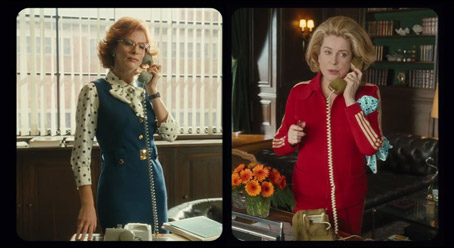
The DTS-HD Master Audio 5.1 surround track is clear and well balanced, with none of the sudden leaps in volume I've experienced on some HD soundtracks of late – even the bang of fireworks is pitched at just the right level. The frontal separation is subtle but effective, but there's not all that much happening at the rear of the room, save for a few notes of music and some location ambient sound. The Linear PCM stereo track is a less subtle affair with a surprisingly audible treble bias.
OK, before we get to the extras that are included, it's worth having a gripe about one that isn't. The star turn on Music Box Films' American DVD release was a 71 minute 'making of' documentary, which provides an enjoyable and enlightening peeks behind the scenes of the shoot, and its absence here is a bit of a disappointment. But to business.
Outtakes (21:19)
A sizeable collection of outtakes that provides us with the usual pleasures of seeing actors fluff their lines, burst out laughing or fall victim to the misadventures of inanimate objects. The first of Depardieu's giggling fumbles is rather fun, and contrasts with Deneuve's increasing irritation and impatience at her mistakes.
Test Costumes (5:43)
One for fans of 70s fashions, consisting of test footage of the actors parading their outfits under studio lighting.
Teaser Trailer (2:11)
A curious little number that, unlike the release trailers I've seen, is designed in the parodic spirit of the film, complete with mock-serious narration and bubbly yellow lettering that throws words like "Communiste!" diagonally across the screen.
A light-hearted, narratively busy and largely enjoyable pastiche aided by a lively and enigmatic cast and a crew who appear to be very much in sync with Ozon's approach. For me it loses something in the later stages, but that's partly my problem and others have had no issue with this tonal shift. At its best StudioCanal's Blu-ray looks and sounds rather good, but loses points for contrast inconsistency, fixed English subtitles and not including the documentary found on the US release.
Rotten Tomatoes AUDIENCE REVIEWS FOR POTICHE
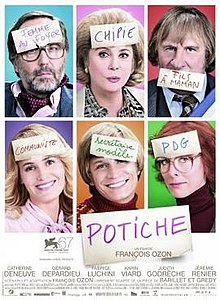
*** Marae B
Dec 17, 2011
was quiet comical but reminded me to much of the orange wed add!! my daughter didn't realise it was an actual film. lol
+++++
*** ½ Pierre M
Dec 13, 2011
Très chouette film d'ambiance hyperseventies ! Le jeu des acteurs est excellent et tiens parfaitement la route au coté d'une action très figée, adaptation de pièce de théâtre oblige. On se croirait dans un réél film d'époque pret à voir débarquer De Funes à tout moment. Luchini d'ailleurs tenant à merveille le rôle de Mr Pujol.
+++++
**** ½ Barry T
Dec 11, 2011
ive seen camper Ouzon films but this was still a reallllly good film. Denuve is excellant so are the clothes
+++++
***** Michael T
Dec 06, 2011
Light and frothy but with a real social message
+++++
* ½ Brice B
Nov 28, 2011
Les acteurs jouent comme dans une piece de theatre ( c'est peut etre volontaire...). Mais a la difference c'est que dans le film on ne rigole pas vraiment
+++++
** ½ Lucile D
Nov 28, 2011
a few good funny moments.
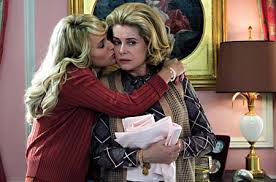
+++++
* Heather J
Nov 25, 2011
I didnt get the humor in this film, maybe because it is a french movie. I usually love a good frenchie but this one just didnt quite do it for me. I may have not been in the right headspace at the time of watching it but I found it to be a tad bit boring.
+++++
** ½ Mark T
Nov 16, 2011
Meh. Just one of those films that just would not have had the attention if based in Wakefield rather than Lille. Probably still have needed the subtitles though.
+++++
*** ½ Javier E
Nov 15, 2011
Catherine Deneuve dando muestras de su excelencia y Francois Ozon dando un camaleonico giro a su carrera de director con un tema de superacion femenina, de gran relevancia y de un excelente tratamiento. Vale mucho la pena.
+++++
**** Cameron J
Nov 14, 2011
Over the top 70s pastiche but without being garish or cheap. Almost a French Arrested Development at the start but turns in to a very fun and entertaining film about empowered women
+++++
*** David P
Oct 30, 2011
Enjoyable french comedy.
+++++
* ½ Tim J
Oct 23, 2011
Deneuve was watchable enough, but we gave up on this half way through. Just too lightweight.
+++++
*** ½ Roman R
Oct 22, 2011
Catherine Deneuve es un tesoro del cine y, a sus 68 años, una mujer sumamente atractiva. Ella es el centro de atencion en "Potiche", una simpatica comedia feminista ambientada en los 70s cuyo estilo tambien emula las peliculas de ese tiempo. Para Francois Ozon es una cinta completamente diferente a sus thrillers eroticos como "Swimming Pool". "Potiche" es muy divertida ya que se nota que su reparto tiene gran quimica (especialmente entre Deneuve y Gerard Depardieu) ademas de que la cinta nos entretiene con su historia de una esposa que tiene que dirigir la empresa de su marido despues de una huelga de los trabajadores. No sera una obra particularmente profunda pero "Potiche" es entretenimiento retro que vale la pena.
+++++
**** Louise C
Oct 20, 2011
This movie was a lot of fun. I definitely recommend it.
+++++
*** Jonathan Y
Oct 17, 2011
A charming film with some great acting. The dancing scene I could have done without though.
+++++
*** ½ scott g
SUPER REVIEWER
Oct 14, 2011
A engageing story, set in the late 70s, and following the trophy wife of the title, here we get to know her and her family during the family owned factory and its labour disputes, as the uncareing husband to her falls ill, she takes over reins, something she has forgotton about since her new status, the film has plenty of light hearted moments and solid themes, it does run along nicely, even though the last third i lost a bit of interest as she further branches out, it comes off a interesting watch.
+++++
**** Simon P
Oct 13, 2011
Sensationally 70s style lightweight French farce with a brilliant cast. Charming viewing pleasure.
